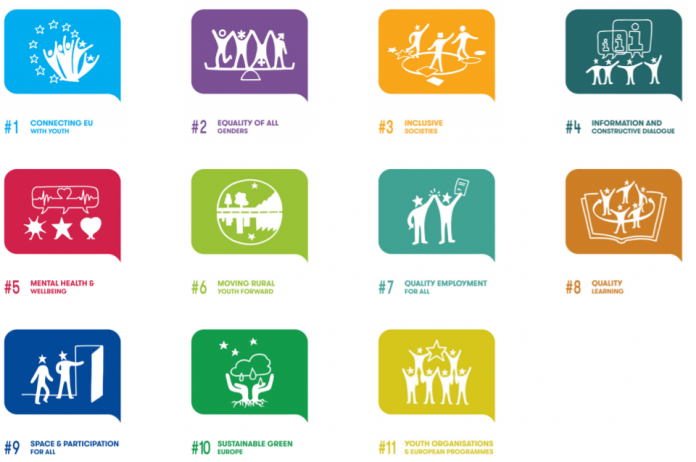The eleven European Youth Goals (2019-2027) that emerged from the Structured Dialogue with Youth 2017-2018[1], are designed to cover young people’s many and various concerns in our changing world. Taking a closer look, one might observe that as a whole these goals point to a fairer and more inclusive society. Thus, most (if not all) of them are interconnected; from trust and participation in European institutions and decisions (Goal 1) to the provision for youths in rural areas (Goal 6), and from the inclusion of marginalised youth (Goal 3) to “greening” the every-day behaviour of individuals (Goal 11). This interconnectedness implies that improvement in one field is not enough, and that societies and politicians need to develop proper actions towards all these goals in order to improve young people’s position.
Cowork4YOUTH is a research project on youth (un)employment, and our particular objectives, areas of focus, and target groups mean that goal seven, Quality Employment for all, is inevitably central to our point of view. In this article, however, we would like to discuss the project’s links with other EYG’s, besides the obvious connection to Goal 7. These links are of two kinds: direct links related to the project’s targets and design; and indirect links, based on the interconnectedness mentioned in the introduction.
Cowork4YOUTH aims to examine and suggest policies on the issues of skills mismatch, brain-drain, and the potential for employment in alternative sectors(such as platform economy and coworking spaces) in two types of non-metropolitan regions, those in energy transitionand those that are tourism-dependent. While the project’s research and conclusions cover the entire NEET population, the subgroups of the long-term unemployedand young mothers are given particular attention. These two subgroups account for the project’s direct links with other EYG’s.
Skills mismatch is a prominent issue in European policies tackling youth unemployment, and therefore Quality Learning (Goal 8) is naturally tightly coupled with Quality Employment. It concerns professional education (e.g., through Vocational Education and Training and Lifelong Learning), as well as more basic themes, such as early school-leaving, which is associated with higher chances of poor professional development and even social marginalisation.
At the same time, Cowork4YOUTH’s focus on non-metropolitan areas (either tourism-dependent or in energy transition) can obviously provide useful insight and recommendations for promoting Goal 6 (Moving Rural Youth Forward). On the one hand, some of the particular objectives of this theme directly refer to more and better jobs and improving the quality of education in a way that can be substantially beneficial for the rural youth. The need, on the other hand, for improving and modernising the infrastructure in such areas creates the space for non-traditional practices (such as coworking spaces and the platform economy) to come in and play an effective role (Neagu et al, 2021).
Given the aforementioned subgroups in focus, namely the long-term unemployed (which is a marginalised group) and the young mothers (who apart from exclusion in general terms, also experience the effects of gender inequality), goals 2 (Equality of All Genders) and 3 (Inclusive Societies) are also highly and directly connected with our project.
There is, however, a subtler link to other EYG’s, besides these direct connections that arise from the particular subgroups: a good quality job can be considered a pathway to social inclusion and gender equality, or even a prerequisite. If the long-term unemployed and the young mothers who abstain from the labour market do not have a real chance of decent work, it will be questionable whether any other measures to support these groups can substantially alleviate the problems they face.
This type of link of Quality Employment to Inclusion and Gender Equality, allows one to identify the importance of Work for other Goals as well. For example, in societies with high levels of unemployment and precarious working relationships it will be hard for young people to develop trust in national or European Institutions and get engaged in participatory democratic activities (Goals 1 and 9), as they might feel that their basic needs are not considered and their voices are not heard. It is also understandable and repeatedly supported by research (e.g., Eurofound, 2012; Feng et al., 2015; Strandh et al., 2014) that unemployment and the state of being a NEET in particular can have a “scarring effect” which affects not only future career development, but also the mental health and well-being of the individuals (Goal 5).
Identifying these interconnections in this short analysis, is not to say that there is any kind of overlap among the established Youth Goals. Each one is developed in a particular area of interest and its specifications are essential for grasping the multiplicity of issues that European youth faces. In fact, the closer examination of each goal can be a source of inspiration as it can reveal additional routes through which youth issues are approached and the variety of implications that working on one of them can have.
[1] https://youth-goals.eu/wp-content/uploads/engl_YouthGoalsHandout.pdf
References
Eurofound (2012) NEETs – Young people not in employment, education or training: Characteristics, costs and policy responses in Europe, Publications Office of the European Union, Luxembourg.
Feng, Z., Everington, D., Ralston, K., Dibben, C., Raab, G. and Graham, E. (2015) Consequences, risk factors, and geography of young people not in education, employment or training (NEET).The Scottish Government, Edinburgh.
Maxon, D. & Barta, O. (2018). Structured Dialogue Cycle VI Thematic Report on Employment. Available from: https://zenodo.org/record/3716202#.YtpsAXZBxPZ
Neagu, G., Berigel, M. and Lendzhova, V., 2021. How Digital Inclusion Increase Opportunities for Young People: Case of NEETs from Bulgaria, Romania and Turkey. Sustainability, 13(14), p.7894.
Strandh, M., Winefield, A., Nilsson, K. and Hammarstöm, A. (2014) Unemployment and mental health scarring during the life course. European Journal of Public Health, 24(3), pp. 440-445.


